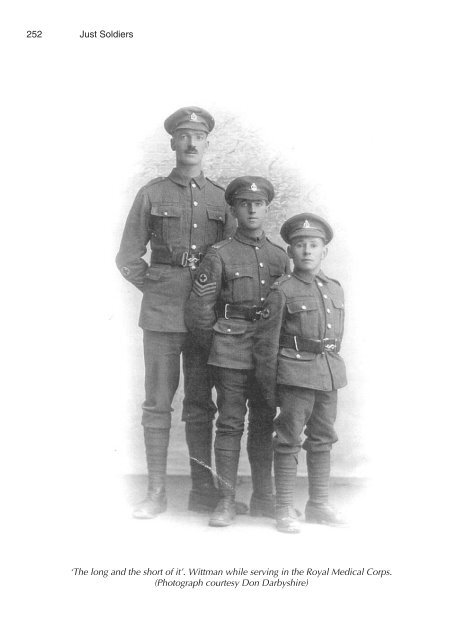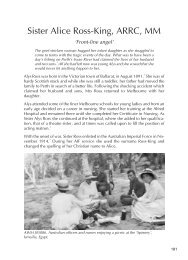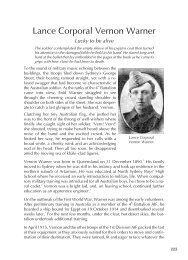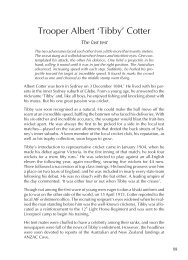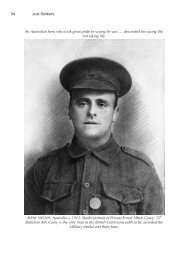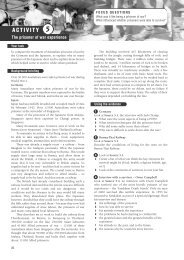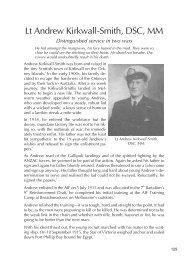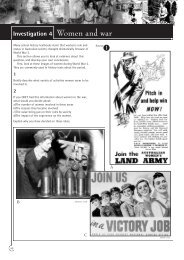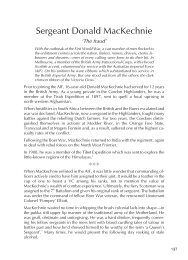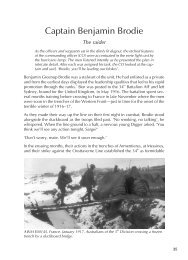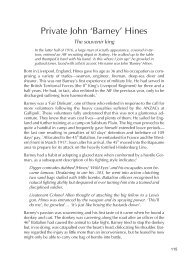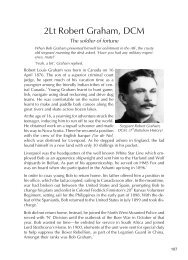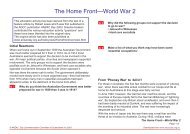WO1 Frank Wittman - ANZAC Day Commemoration Committee ...
WO1 Frank Wittman - ANZAC Day Commemoration Committee ...
WO1 Frank Wittman - ANZAC Day Commemoration Committee ...
You also want an ePaper? Increase the reach of your titles
YUMPU automatically turns print PDFs into web optimized ePapers that Google loves.
252 Just Soldiers<br />
‘The long and the short of it’. <strong>Wittman</strong> while serving in the Royal Medical Corps.<br />
(Photograph courtesy Don Darbyshire)
<strong>WO1</strong> <strong>Frank</strong> <strong>Wittman</strong><br />
Determined to serve<br />
We Will Defend the Motherland to the Last<br />
Man and the Last Shilling. 1<br />
When these fighting words were splashed across the front pages of newspapers<br />
by the Australian press, there was no shortage of men willing to volunteer<br />
to serve King and Empire: men from the city and the bush; men from<br />
rich and poor backgrounds; labourers, tradesmen and professionals—men<br />
of every size and shape answered their country’s call.<br />
In Melbourne, a young man took his place at the head of the queue. The recruiting<br />
sergeant stood to address the volunteer who could barely be seen<br />
over the desk. The sergeant looked down at the man and said, ‘Sorry lad,<br />
you’re a bit too short for us’.<br />
<strong>Frank</strong> <strong>Wittman</strong> was born near the central Victorian town of Warragul. A bright<br />
lad, <strong>Wittman</strong> completed his schooling at Wesley College, where, as well as being<br />
a bright and diligent student, he also earned his school’s coveted ‘colours’ for<br />
his first-class performance as a cox on the rowing team. On completion of his<br />
studies he became a pharmacist and a podiatrist and operated successful pharmacies<br />
in Melbourne.<br />
<br />
The minimum height for eligibility to enlist in the Australian Imperial Force was<br />
5 foot 2 inches (1.55 metres) but <strong>Wittman</strong> stood a mere 3 foot 8 inches tall (1.12<br />
metres). What <strong>Frank</strong> <strong>Wittman</strong> lacked in height, he made up for in sheer perseverance—he<br />
refused to be treated as undesirable because of his stature. He sought<br />
the assistance of a general and a colonel to support his case to be accepted into<br />
the AIF. His persistence paid off when, in May 1915, aged 26 years and 5<br />
months, he was sworn into the Australian Imperial Force. 2<br />
After undergoing basic training at Broadmeadows, <strong>Frank</strong> was posted to the AIF<br />
Convalescent Hospital at Geelong. The wards were full of wounded soldiers<br />
who had been repatriated from the battlefields of Gallipoli and <strong>Frank</strong> listened intently<br />
to the Diggers’ stories of life in the trenches and their accounts of innumerable<br />
clashes with the Turks.<br />
After serving for more than a year on home soil, <strong>Wittman</strong> became impatient to<br />
be posted overseas. His requests to be sent to the front were refused on the basis<br />
that, owing to his height—or lack thereof—he would not be permitted to serve<br />
outside Australia. <strong>Wittman</strong> was furious. He was a soldier and just as capable of<br />
performing his duty as the next man. He applied for and was granted his discharge<br />
from the AIF.
254 Just Soldiers<br />
Paying his own way, <strong>Frank</strong> sailed for England and made application to join the<br />
British Army. <strong>Wittman</strong>’s credentials spoke for themselves. He was accepted and<br />
assigned to the Royal Army Medical Corps and posted to India. 2<br />
When the Ottoman Empire (Turkey) entered the war in early November 1914,<br />
the War Office in London considered the possibility of other Islamic countries<br />
coming to Turkey’s aid. The main concern was Mesopotamia (now Iraq), for if<br />
this nation chose to fight, it could place more than three quarters of a million<br />
men into the field. 3<br />
Troops of the British 6 th Division, commanded by Major General Townshend,<br />
were hurriedly despatched to take Baghdad—a ploy to demoralise the<br />
Mesopotamian forces. Landing at the southern town of Basra, Townshend established<br />
a forward operating base for his push north along the River Tigris. This<br />
protracted war weakened the Division, which lacked two vital elements to sustain<br />
its mission—communications and additional medical support.<br />
To provide the much-needed medical support, the British Army transferred a<br />
large contingent of medical staff from its Indian outposts, including <strong>Wittman</strong><br />
who was now a sergeant. 5<br />
<strong>Frank</strong> was a natural leader and was respected by superiors, peers and those he<br />
commanded. His staunch, charismatic style overshadowed any misconceptions<br />
that arose from his lack of height. <strong>Wittman</strong> reinforced this when commanding<br />
a draft of troops during their embarkation for the Front. As he was<br />
giving directions to his men, he was all but swallowed up by the crowd of<br />
troops milling all around him. An old school chum, noticing <strong>Wittman</strong>’s plight,<br />
went to the rescue of the little soldier and lifted him up onto his shoulders.<br />
Without so much as a falter, <strong>Wittman</strong> continued to issue commands and the<br />
embarkation of his troops continued without incident. 5<br />
Conditions in Mesopotamia could best be described as appalling. Overwhelmed<br />
by the oppressive heat, flies and disease, more soldiers became victims of sickness,<br />
than suffered combat wounds inflicted by the enemy. As the casualties<br />
mounted, the dedicated medics worked long hours to provide the best possible<br />
care for their patients. <strong>Wittman</strong> spent most of his day dispensing desperately<br />
needed drugs and medicines.<br />
<strong>Frank</strong> <strong>Wittman</strong> served in Mesopotamia until 1919. After returning to England, he<br />
took his discharge and sailed for Australia, where he resumed his career as a<br />
pharmacist in suburban Melbourne.<br />
<br />
On 3 September 1939, Britain declared war on Germany. As in the Great War of<br />
1914–1918, Australia, a loyal member of the Empire, raised a volunteer force for<br />
service overseas. For two years, Australians did not feel particularly imperiled by<br />
a war halfway round the world. Then in December 1941, Japan declared its
Warrant Officer Class One <strong>Frank</strong> <strong>Wittman</strong> 255<br />
intention to rid Asia of European domination and control of its resources and<br />
suddenly Australia had every reason to feel threatened and vulnerable.<br />
With the 6 th ,7 th and 9 th Divisions of the 2 nd Australian Imperial Force engaged in<br />
combat in the Middle East and the 8 th Division fighting for its life in Malaya, the<br />
outlook was certainly bleak. Australia needed every able-bodied man in this, the<br />
country’s darkest hour.<br />
<strong>Frank</strong> <strong>Wittman</strong>, now aged 52 years and 10 months, again offered his services to<br />
his country. As in 1914, he faced the same prejudice—he was too short. In an<br />
impassioned letter to an influential public servant, <strong>Wittman</strong> wrote, ‘I want to be<br />
of use in this war, and I’m sorry that my stature has so far been a barrier to an appointment<br />
with the AIF or even in a home service capacity’.<br />
He persisted in his efforts to be accepted for active service. His perseverance finally<br />
paid off and he was sworn into the militia on 26 February 1942. Assigned<br />
to the Intelligence Corps, he was engaged in cipher work. In March 1942 <strong>Frank</strong><br />
was promoted to sergeant and in September<br />
1943 he was promoted to staff sergeant. On<br />
18 May 1944, <strong>Wittman</strong> transferred to the<br />
Australian Army Medical Corps to work as a<br />
pharmacist.<br />
<strong>Wittman</strong> continued to serve in the Citizen<br />
Military Forces (CMF) during the post-war<br />
years. In 1947 he volunteered for service<br />
with the British Commonwealth Occupation<br />
Forces (BCOF) in Japan, but was ruled medically<br />
unfit. In May 1948, he was promoted to<br />
temporary warrant officer class one (<strong>WO1</strong>)<br />
and was given permission to enlist in the<br />
Regular Army Special Reserve, with the understanding<br />
that he would be released at a<br />
time of his choosing.<br />
At the time of his application, he wrote to the<br />
Director of the Australian Army Medical Service,<br />
stating, ‘I have not taken one day’s sick<br />
leave during the whole of my service. My acceptance<br />
in the army was never automatic.<br />
There were always obstacles to be overcome.’<br />
4<br />
On 17 March 1950, <strong>WO1</strong> <strong>Frank</strong> <strong>Wittman</strong> tidied<br />
his desk for the last time. He paused at<br />
the door and turned for a final inspection of<br />
<strong>Frank</strong> <strong>Wittman</strong> in India. (Photograph<br />
courtesy Don Darbyshire)
256 Just Soldiers<br />
his pharmacy. He switched off the light and closed the door, thus ending his military<br />
career. At the stroke of midnight <strong>Frank</strong>, now aged 61, was automatically<br />
discharged from the Australian Army. He was placed on the retired list with the<br />
rank of honorary lieutenant. 5<br />
On 15 August 1970, at the grand old age of 81, the man who was the smallest<br />
ever to enlist in the Australian Army, but whose stature belied the measure of his<br />
courage and fortitude, quietly passed away.<br />
Author’s note: I would like to thank Melbourne writer Mr Don Darbyshire, for<br />
providing information and photographs for use in this story.<br />
Notes<br />
1 Prime Minister Andrew Fisher, declaration of extent to which Australia would support Great Britain in the war<br />
against Germany, 4 August 1914.<br />
2 D Darbyshire, ‘The Littlest Digger’, Aussie Post, 18 April 1998.<br />
3 Burke, K (ed.) With horse and morse in Mesopotamia: the story of <strong>ANZAC</strong>s in Asia, A&NZ Wireless Signal<br />
Squadron History <strong>Committee</strong>, Sydney, 1927.<br />
4 F <strong>Wittman</strong>, letter to Army Headquarters, Melbourne, 9 February 1949.<br />
5 Army Headquarters, Melbourne, letter to F <strong>Wittman</strong>, 20 March 1950.


